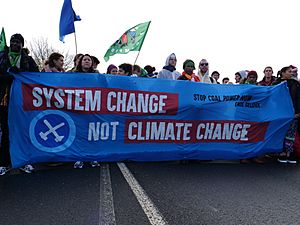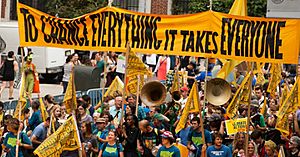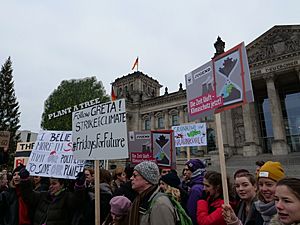Climate movement facts for kids
The climate movement is the collective of nongovernmental organizations engaged in activism related to the issues of climate change. It is a subset of the broader environmental movement, but some regard it as a new social movement itself given its scope, strength and activities.
Contents
History
The climate movement has rapidly evolved in the first decades of the 21st century, starting as one of the many causes of the environmental movement.
Activism related to climate change began in the 1990s, when major environmental organizations became involved in the discussions about climate, mainly in the UNFCCC framework. In the 2000s several climate-specific organizations were founded, such as 350.org, Energy Action Coalition, and the Global Call for Climate Action.
Mobilization for Copenhagen 2009
The 2009 United Nations Climate Change Conference in Copenhagen was the first UNFCCC summit in which the climate movement started showing its mobilization power at a large scale. Between 40,000 and 100,000 people attended a march in Copenhagen on December 12 calling for a global agreement on climate. And activism went beyond Copenhagen, with more than 5,400 rallies and demonstrations took place around the world simultaneously.
Activities
2014 People’s Climate March
The climate movement convened its largest single event on 21 September 2014, when it mobilized 400,000 activists in New York during the People’s Climate March (plus several thousands more in other cities), organized by the People's Climate Movement, to demand a climate action from the global leaders gathered for the 2014 UN Climate Summit.
Fossil Fuel Divestment
The Fossil Fuel Divestment movement calls for colleges and universities, as well as cities, states, religious institutions, and pension funds to withdraw their investments from fossil fuel companies. 350.org launched their Go Fossil Free campaign in 2012 with Bill McKibben's "Do The Math" speaking tour around the country. 350.org explains that the reasoning behind this campaign is simple: "If it is wrong to wreck the climate, then it is wrong to profit from that wreckage." The Fossil Fuel Divestment movement escalated tactics in the spring of 2015, with 19 students arrested at Yale University, a week-long blockade of Harvard University's administrative buildings, a 70-student sit-in at Tulane University, and other arrestable actions.
Climate Mobilization
Since 2014, growing portions of the climate movement, especially in the United States have been organizing for an international economic response to climate change on the scale of the mobilization of the American home front during World War II, with the goal of rapidly slashing carbon emissions and transitioning to 100% clean energy faster than the free market is likely to allow. Throughout 2015 and 2016, The Climate Mobilization led grassroots campaigns in the U.S. for this scale of ambition, and in July 2016, activists succeeded in getting text adopted into the Democratic Party's national platform calling for WWII-scale climate mobilization. In August 2015, environmentalist Bill McKibben published an article in the New Republic rallying Americans to "declare war on climate change."
School strikes for climate
Since August 2018, inspired by Greta Thunberg, children and students in at least 270 cities took part in school strikes for climate.
Roles of other movements
The climate movement is closely connected to other parts of the environmental movement, in particular groups aiming for a sustainable society and sustainable energy. Also the faith community has been active in the climate movement, both at an interfaith level (such as in Our Voices) and at the specific level of each denomination (such as the Global Catholic Climate Movement).
What can work in climate campaigns
Three approaches may be useful in climatic campaigns:
- the provision of information,
- framing of information about aspects of global climate change, and
- challenging the terms of political debates.
All three of these approaches can be easily implemented in climate campaigns aimed at the general public. The information about the impacts of global climate change plays a role in forming climatic beliefs, attitude and behavior, while the effects of other approaches (e.g. provision of information about solutions to GCC, consensus framing, use of mechanistic information) is yet mostly unknown. The third approach is to create space for discussions that move beyond questions of economic interests that often dominate political debates to emphasize ecological values and grass-roots democracy. This has been argued to be crucial to bringing about more significant structural change.
Images for kids





